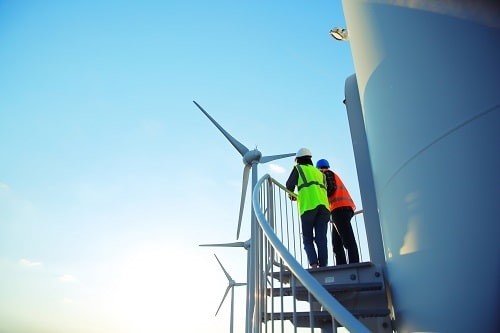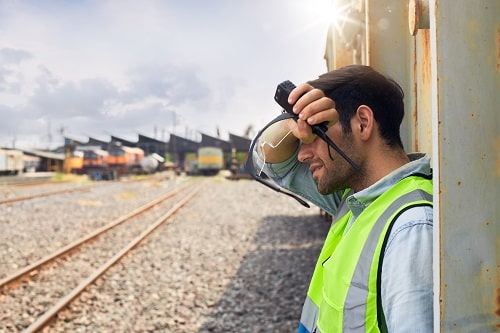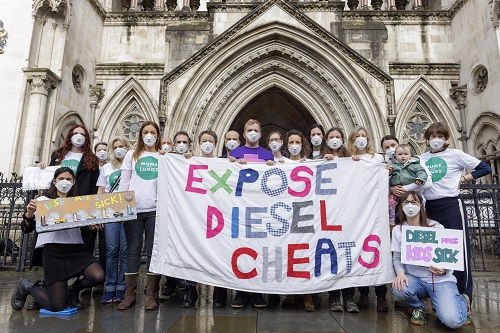The UK’s renewable energy sector is set for huge growth in the coming years, but there are worrying signs its health and safety performance is lagging behind.
Opinion
Renewables: time for a big push on safety
Generating sufficient clean energy is vital to curbing carbon emissions and avoiding the worst effects of the climate emergency. It is encouraging, then, that the renewables industry has witnessed such considerable growth in the past decade. But the recent growth in the industry has not always been accompanied by the robust health and safety processes we see in other forms of energy generation.
Estimates suggest we need to create a 400,000-strong skilled energy workforce over the next three decades to deliver net zero. The renewables industry must be welcoming and inclusive – ensuring employees’ safety, health and dignity is a key part of this. At Prospect, we are concerned that this growing workforce will not enjoy decent and safe jobs without employers involving trade unions in health and safety matters and without the right regulatory framework – both of which are currently, at best, substandard.
 Estimates suggest we need to create a 400,000-strong skilled energy workforce over the next three decades to deliver net zero. Photograph: iStock
Estimates suggest we need to create a 400,000-strong skilled energy workforce over the next three decades to deliver net zero. Photograph: iStock
Prospect represents more than 22,000 members working across all parts of the energy sector and, increasingly, in renewables. As a union, we have huge experience of working with employers to deliver healthy and safe workplaces in many high hazard industries, both within the energy industry – including in conventional and nuclear generation, electricity transmission and distribution – and beyond it. Our members and reps are experts in their fields – engineers, managers and specialists who have deep knowledge of their work and the risks it poses. Their insight must be utilised.
Construction, operation, maintenance and decommissioning of wind farms, be that offshore or on, present significant challenges and multiple hazards, in conditions that are often arduous and unpleasant. These have led to a number of high-profile incidents in recent years.
But while the hazards in renewables are various and complex, they are not the only industry with these risks.
Safety improvements ‘tailing off’
Standards have generally improved over the past decade, as the industry matured and learned from the experience and knowledge of other sectors, be that other forms of energy generation or, in the case of offshore renewables in particular, oil and gas. But in more recent years worrying evidence has emerged that this is tailing off, perhaps even going backwards.
According to the industry’s own figures, in 2020 the rate of lost time to injuries in UK offshore renewables was four times as high as in offshore oil and gas, itself a high hazard industry. While the rate in onshore renewables was far better, it was still higher than in the offshore oil industry.
The Health and Safety Executive (HSE) was forced to intervene in 2020 following serious incidents both in the UK and elsewhere. The previous year also saw a large spike in the lost time injury rate. The regulator wrote to G+ and SafetyOn, two employers’ health and safety bodies covering offshore and onshore wind respectively, warning that “improvement in health and safety performance has at best stalled if not reversed”.
The HSE outlined a series of concerns, including fatigue, cost reductions, training and supervision, and inspections of work equipment.
A well trained and competent workforce will be key to delivering a safe industry. We therefore welcome the fact that RenewableUK, the Global Wind Organisation and Offshore Petroleum Industry Training Organization (OPITO) are looking to support the mutual recognition of safety and technical competence training standards across the offshore wind and oil and gas sectors. This will reduce barriers that could prevent heath and safety and technical experts entering the industry. This will bring further competency and good practice from oil and gas into renewables, to the benefit of both sectors.
Publish workforce health data
However, we know from our members that long hours, fatigue and stress are rife in renewables. Staff working offshore are likely to be on shifts and can work up to 12 hours for days and days on end, all while away from home. Cost pressures mean work must be completed within small timeframes, which is exacerbated by weather conditions or having many different companies working on the same project.
These factors pile pressure on employees, who face increasing workloads and long hours. The industry already publishes data on accidents and incidents, and it must urgently supplement this with health data so we can collectively work together to reduce the risk to health.
Fatigue and stress are harmful in themselves and can lead to a range of health problems, but they can also adversely affect how people behave and the decisions they make, potentially increasing the risk of accidents. Fatigue, in particular, can result in slower reactions, reduced ability to process information and underestimation of risk, leading to errors and accidents, ill health and injury.
While employers in the industry have recognised these issues and are starting to take steps to address them, too few have implemented sustainable solutions that get to the root of the problem. Prospect believes that, in line with industry and HSE advice, employers should adopt a risk-based approach to stress and fatigue which ensures that – just like any other health and safety issue – risks are identified, understood, monitored and controlled.
Poor worker consultation
One distinguishing feature of the oil and gas industry, compared with offshore renewables, is that it has regulations requiring employers to consult workforce representatives on health and safety matters – laws introduced in the wake of the Piper Alpha offshore disaster. This mirrors similar arrangements on land that require employers to consult union health and safety representatives. However, these arrangements are missing in offshore renewables.
Expert evidence shows that effective worker engagement is key to health and safety. Trade unions are the most effective tool we have in ensuring healthy and safe workplaces – our experience tells us this, but independent experts agree.
Research has shown that union health and safety reps and joint consultation arrangements reduce accident rates by as much as 50 per cent, and that the higher the number of trade union members in a workplace the lower the number
of accidents and cases of ill health.
Despite this, employee consultation in renewables on health and safety matters is poor – members, HSE and employers have told us so.
We are therefore extremely concerned that UK laws requiring employers to consult employees and their representatives on health and safety matters do not extend to the territorial seas, the UK continental shelf or Renewable Energy Zones. Almost all other health and safety laws extend to these areas, so for key regulations on consultation to be missing is a worrying oversight.
While there are maritime safety regulations concerning consultation on certain vessels, we are nevertheless left with an inadequate and threadbare patchwork of laws that are, at best, confusing and arbitrary.
Prospect is calling on the government to extend the scope of the laws that govern consultation with employees and their representatives to offshore renewables. The government must address this as a matter of urgency – the offshore workforce will only grow as developers look to build wind farms further from shore.
In the meantime, we want all offshore renewables employers to consult their workforce via health and safety committees and to uphold the onshore rights of health and safety representatives in offshore environments.
Working in any job should not compromise your wellbeing, but there is a unique dynamic in renewables because it is growing rapidly as we respond to the climate emergency. Ensuring employers consult employees will be key in safeguarding the dignity of this growing workforce.
Prospect’s briefing document on health and safety in renewables here
Sue Ferns is Senior deputy general secretary at Prospect union
OPINION

Heat at work: a silent killer
By Halshka Graczyk and Lacye Groening, ILO on 07 April 2025
Workers across the world are increasingly being exposed to excessive heat with serious implications for their safety and health. It is therefore vital that governments, employers and workers’ organisations develop, share and implement practical and low-cost strategies and measures for effectively reducing the risk from heat stress at work.

Making good work the foundation
By Mike Robinson FCA, British Safety Council on 07 April 2025
In 2024, for the first time, the UK dropped out of the list of the top 20 happiest countries: according to the World Happiness Index. This year, the UK rests in 23rd place, slightly ahead of the US and behind the Nordic countries, Germany, the UAE and others.

The air we share: why tackling pollution protects us all
By Scott Paul, Mums for Lungs on 04 April 2025
Air pollution is often invisible; its impact is anything but. Whether you’re a parent worried about your child’s lungs, a construction worker breathing exhaust fumes, or a commuter passing through busy streets, polluted air is everyone’s problem.



